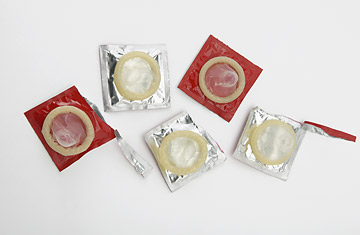
On July 17, Dr. Anthony Fauci, director of the National Institute of Allergy and Infectious Diseases, scrapped plans for a large clinical trial of the government's most advanced HIV vaccine candidate to date. The vaccine, a two-shot injection, was designed to fight HIV infection a new way — by activating the body's cell-based immune responses rather than by relying on antibodies to HIV.
The decision did not come as a complete surprise, since a similar and widely publicized vaccine developed by Merck failed to prevent infection or control HIV replication in a trial last year. At issue is the fact that researchers still don't know exactly how the body defends against HIV. Without critical knowledge of the precise immune factors, or correlates, that prevent infection, testing any vaccine candidate that functions by triggering immune defenses would be guesswork. That's why, Fauci says, he rejected the proposal to do a large trial, involving thousands of patients and numerous immune correlates. "What I will entertain is a leaner, meaner and smaller trial that precisely asks and answers, 'Does the vaccine work and is it successful in lowering viral load?'" Fauci says. "If it does, then we go back and start investing more money, people and samples to see if we can find the right immunological correlates. If it doesn't, then it doesn't matter what the immune correlates are, because it didn't work."
The trial that Fauci canceled last week was already a slimmed down version of the original 8,500-person study that government health officials had planned — until the Merck vaccine failed last fall. In a trial of 3,000 volunteers, Merck's vaccine appeared to increase risk of HIV infection, a phenomenon that researchers later attributed to the vaccine's delivery system — pieces of HIV were piggybacked onto a common cold virus and ferried to the body's immune cells. It turned out that the people who received the vaccine and who ended up with the highest rates of HIV infection following injection were also those who had high levels of antibodies to the cold virus, thus negating any immune-boosting effects of the vaccine.
The government's trial of its vaccine, PAVE, for Partnership for AIDS Vaccine Evaluation, was to have included only people with low levels of cold-virus antibodies, but Fauci argues that any information that could have been gleaned even from the smaller trial might not have proved useful. "Even pared down, the trial was too big," he says, "and was asking too many questions before we even knew if this thing worked. So I asked them to go back and give me a slimmer study that asks the question 'Does it work?'"
So far, he says, the best way to answer that question is by narrowing the focus of a vaccine study to see if it can do one thing: reduce the viral load in someone infected with HIV. If a vaccine can do that, it's worth looking at more closely to figure out how it does it. "Scaling back the trial to look at a single endpoint is a concept that a number of us have championed," agrees Wayne Koff, senior vice president of research and development at the International AIDS Vaccine Initiative.
Fauci says the decision doesn't spell the end for the cell-based approach — he just believes more basic work is necessary to understand how these approaches work. And conducting smaller, more focused trials help to do just that.
